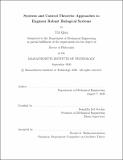Systems and control theoretic approaches to engineer robust biological systems
Author(s)
Qian, Yili.
Download1227042586-MIT.pdf (6.111Mb)
Other Contributors
Massachusetts Institute of Technology. Department of Mechanical Engineering.
Advisor
Domitilla Del Vecchio.
Terms of use
Metadata
Show full item recordAbstract
Synthetic biology is an emerging field of research aimed to engineer biological systems by inserting programmed DNA molecules into living cells. These DNAs encode the production and subsequent interactions of biomolecules that allow the cells to have novel sensing, computing, and actuation capabilities. However, most success stories to date rely heavily on trial and error. This is mainly because genetic systems are context-dependent: the expression level of a synthetic gene often depends not only on its own regulatory inputs, but also on the expression of other supposedly unconnected genes. This lack of modularity leads to unexpected behaviors when multiple genetic subsystems are composed together, making it difficult to engineer complex systems that function predictably and robustly in practice. This thesis characterizes resource competition as a form of context dependence, and presents control theoretic approaches to engineer robust, context-independent gene networks. We first present a systems framework to model resource competition, which results in a hidden layer of unintended interactions among genetic subsystems. These unintended interactions lead to failure of the composed network in experiment. We then introduce a set of biomolecular controllers - designed to solve an output regulation problem in vivo - that can decouple a genetic subsystem's output from its context. We describe challenges applying classical control theory to engineer such controllers due to the physical constraints in living cells, and then present novel theory-guided engineering solutions. Finally, we point to additional design considerations when regulating multiple subsystems using multiple controllers in a single cell. These works have the potential to enhance the robustness of future synthetic biological systems and to fully unleash their power to address pressing societal needs in environment, energy, and health.
Description
Thesis: Ph. D., Massachusetts Institute of Technology, Department of Mechanical Engineering, 2020 Cataloged from student-submitted PDF of thesis. Includes bibliographical references (pages 189-203).
Date issued
2020Department
Massachusetts Institute of Technology. Department of Mechanical EngineeringPublisher
Massachusetts Institute of Technology
Keywords
Mechanical Engineering.